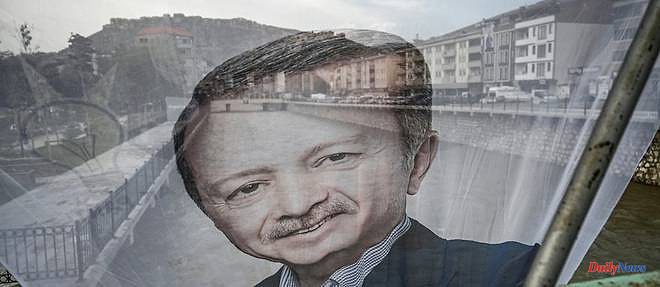In Bayburt, a town in eastern Anatolia with its old Fiats, its rummy games and its yellow tulips, where life seems as calm as the rapids of the Coruh river are brisk, support for the "Erdogan fortress" is massive.
This verdant and rural province located between the Black Sea and Mount Palandoken is the least populated in Turkey (84,200 inhabitants) and the least contributor to the national GDP.
But she is also the one who voted the most overwhelmingly for Recep Tayyip Erdogan in the first round of the presidential election on May 14: nearly 80% of the vote, against 49.5% at the national level.
"To know Bayburt's heart is to know Turkey," says Orhan Ates, burgundy sweater and tie under a blue suit. Just elected deputy during the legislative elections in mid-May, the 47-year-old ophthalmologist is struggling for the head of state and president of the AKP party, given favorite on Sunday against the social democrat Kemal Kiliçdaroglu.
"Are you ready to send our president back?" Orhan Ates repeats through the alleys of Bayburt, nodding in all directions to the men whose hands are gripped by a tesbih, the Ottoman rosary.
“Yes, God willing,” some respond, slipping their grievances along the way.
From time to time, the deputy draws his phone and approaches to scrutinize the eye of a man with a toothless smile, dispensing a consultation in the middle of the street, before delivering a prescription on a crumpled corner of paper to another man with worn shoes.
A pat on the shoulder here, a shared tea there. From the seller of tools to the hairdresser, television connected to the official channel, hardly a shop escapes its rounds.
"I started as a shoe shiner, I became a professor of medicine. People see themselves in me, as we see themselves in Erdogan", whose family is from Rize, the neighboring province.
"He speaks to everyone, not just to the elites", assures the elected official to AFP before running to inaugurate the cultural event of the moment - children's drawings exhibited in a gymnasium - then to attend three funerals.
“We are a big family here and Erdogan is part of it, he is as solid as our thousand-year-old castle” which overlooks the city, abounds Haci Ali Polat, provincial head of the AKP.
If we vote for Erdogan in Bayburt, explain residents interviewed by AFP, it is because he "repels the attacks of external powers" just as Bayburt resisted the Russians in the 19th century or, as mayor Hukmu Pekmezci, during "the Armenian atrocities of 1916-18". (More than twenty countries including the United States and France as well as the European Parliament and the Council of Europe have recognized the reality of the Armenian "genocide" of 1915 described as a "massacre" by the Turkish authorities, Editor's note .)
"Erdogan produced his own boats, his own weapons, his own planes," said 19-year-old Muhammed Emre Teymur. "We do not vote for a cucumber (pejorative term, editor's note) because of the price of the onion", says this construction worker who earns 10,000 Turkish liras (470 euros) monthly.
Soaring onion prices have become an opposition campaign marker to illustrate high inflation.
"We are nationalists and conservatives and we love Erdogan", for his uninhibited political Islam and for "subsidies to breeders and the construction of dams very beneficial to farmers", lists Bedirhan Bayen, 26 years old.
"There is a whole system (of subsidies) in place and no one wants to lose it", summarizes the young graduate sitting at the back of his father's store.
Not far from there, in his sewing workshop, Bülent Hacihasanoglu argues that in small villages, some are afraid to vote differently “for fear of being blacklisted”. He, on the other hand, speaks loudly and indicates that he will vote for Kiliçdaroglu for "a return to the parliamentary regime".
Like him, many say they want to see Bayburt regain the opulence he enjoyed when the city was a stopover on the Silk Road.
The inhabitants are loyal, says Yusuf Yolcu in his insurance firm. "Even on September 12" - a reference to the 1980 coup - there was no incident in Bayburt, insists the 50-year-old. "Nothing either during the Gezi incidents", the great protest movement that shook the country in Istanbul in 2013.
"It would be great if he rewarded us in return, if he built a factory for us, gave us job opportunities," he adds of the president.
Bedirhan Bayen agrees and clarifies: "What people want is a strong leader". He would have liked a "new face", but Kiliçdaroglu seems "weak" to him.
26/05/2023 14:06:21 - Bayburt (Turquie) (AFP) © 2023 AFP












